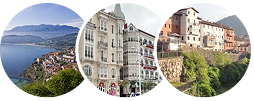Our Expert Touch
Our team of experts have over 35 years travel expertise in Spain & Portugal.
You’ll receive friendly, personal service from start to finish of the booking process.
Call and speak to Andy, Leonor or Antonio about your dream holiday in Spain & Portugal...

Stay Updated
Get exclusive deals, travel tips, and destination inspiration delivered directly to your inbox.
NO SPAM - UNSUBSCRIBE ANYTIME


















